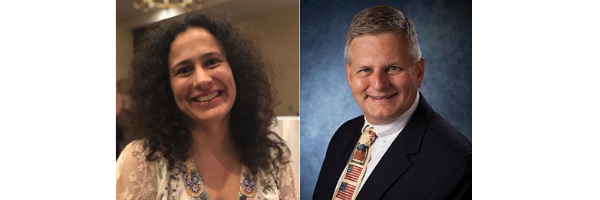 Editor’s Note: For this edition of TSSP, NCSS Executive Director Lawrence Paska is joined by National Association of Media Literacy Education (NAMLE) Executive Director Michelle Ciulla Lipkin to celebrate the vital role of media literacy in the social studies during 2020 U.S. Media Literacy Week.
Editor’s Note: For this edition of TSSP, NCSS Executive Director Lawrence Paska is joined by National Association of Media Literacy Education (NAMLE) Executive Director Michelle Ciulla Lipkin to celebrate the vital role of media literacy in the social studies during 2020 U.S. Media Literacy Week.
To become a successful student, responsible citizen, productive worker, or competent and conscientious consumer, individuals need to develop expertise with the increasingly sophisticated, multi-sensory media world. Media literacy represents a necessary, inevitable, and realistic response to the complex, ever-changing information and communication landscape that surrounds us in 2020. It’s no secret that the ways in which our students produce and consume information are rapidly evolving. Just when we thought we were grappling with some best practices for discussing social media, controversial issues, and multiple perspectives in classroom discussions, our entire nation (world) was thrust online for what is arguably the most sudden, profound, and sustained shift for education in human history. The urgency to read, write, and think about the media takes on entirely new dimensions when our classroom practice is mixed in virtual, hybrid, and face-to-face settings; when new forms of engagement and communication emerge almost daily; and when questions about the health and vibrancy of our very republic are debated publicly.
Media literacy education should be the norm in our homes and schools. The only way we will advance and scale media literacy throughout the educational system is through joint efforts and continued collaboration. Once again, NCSS joins forces with NAMLE to support U.S. Media Literacy Week. This week is held in conjunction with UNESCO’s Global Media and Information Literacy (MIL) Week, which means media literacy education is a universal focus across all disciplines. The National Media Literacy Alliance, a network of leading U.S. education organizations including NCSS and NAMLE, has issued a statement for Media Literacy Week in support of media literacy education as a vital component of their respective disciplines. This is the week to begin or renew our commitment to read, write, and think critically about the media.
Each day, U.S. Media Literacy Week celebrates one of the five components which define media literacy: Access, Analyze, Evaluate, Create, and Act. There are virtual events all week that are free and open to the public and cover a variety of media literacy concepts from representation to youth civic engagement to verifying information. During this week, NCSS is taking more action to elevate media literacy as a fundamental part of social studies inquiry aligned to our C3 Inquiry Arc.
First, join us on Thursday, October 29 at 1:00 PM ET for a special Media Literacy Town Hall. NCSS and NAMLE will moderate two outstanding thought leaders in media literacy education: Chris Sperry (Project Look Sharp, and co-author of our NCSS position statement on media literacy) and Rachel Roberson (KQED). Our Town Hall will explore how media literacy and social studies intersect - especially through the C3 Framework and the challenges and opportunities presented by media literacy education in helping us to prepare all students for active civic engagement. If you cannot attend the live broadcast, this program will be available to view in our Digital Library.
Second, we have curated several recent articles from our publications that provide expert scholarship and teaching resources to support media literacy in your classroom. Please visit our open access list of Media Literacy Featured Resources to build a strong conversation for media literacy starting this week and beyond.
Third, we invite you to attend #NCSS2020 - our first-ever virtual social studies conference, this December 4-6, 2020. With 200+ hours of content available live over the opening weekend and available on-demand through April 30, 2021, this year’s conference literally expands the boundaries of time and space. You can continue to register and participate in our 2020 annual conference well into 2021. As for the confirmed speaker line-up, media literacy is a strong focus of our learning this year!

We are delighted to welcome speakers who will challenge us to inquire and take informed action, based on their professional service as scholars, researchers, writers, public officials, and activists. As so much media time is focused on the 2020 election, for example, we will feature White House correspondent Yamiche Alcindor and political commentator Charlie Sykes, who will conduct an expert analysis of the 2020 United States General Election on December 5, 2020 at 2:30 PM ET. Chuck Todd, the political director for NBC News, will moderate the session. Your registration gives access to three full conferences in one: joining us again this year is the National Council for Geographic Education (NCGE), and we welcome the American Bar Association-Division for Public Education’s National Law-Related Education Conference to our community of social studies professional learning.
NAMLE’s national conference will take place on July 16-18, 2021 and also revolve around a social justice theme. There is no surprise that both of our organizations chose to focus on this important topic and we look forward to how the conference conversations will complement each other. We encourage you to sign up for NAMLE membership, which is free for individuals. Sign up today to join the movement for a media literate world.
NAMLE and NCSS stand together to ensure our students are prepared for the world they will lead. We will continue to work as partners to expand the practice of media literacy education throughout the country in the social studies classroom and beyond.
Happy Media Literacy Week to all!